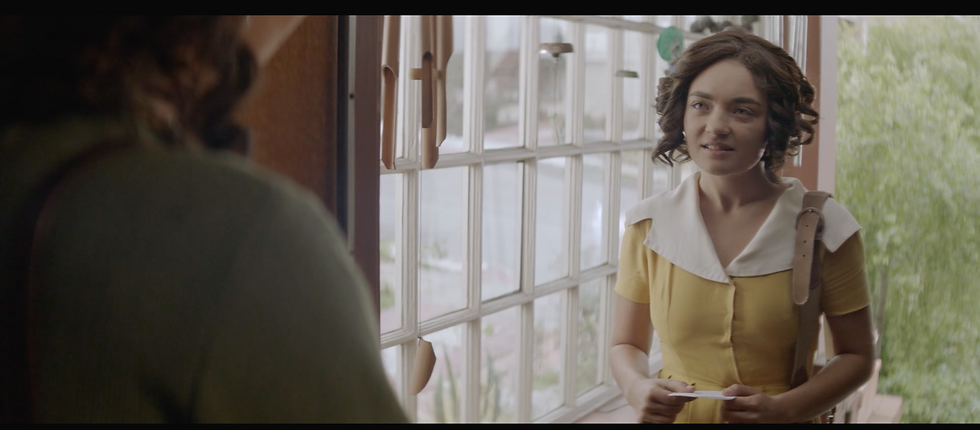"As long as you keep moving forward, your talent and resilience will win out"
- Festigious

- Sep 23, 2017
- 7 min read
Some films that win Best Picture take us on a journey and we can't help but feel inspired. One of these memorable films is Letters From Alcatraz - an absolutely terrific period drama that won Best Picture, Best Director, Best Actress and Best Supporting Actor at Festigious. Join us for an interview with Los Angeles based writer and director Madeline Rozwat, the creator behind this beautiful concept, as she shares her journey behind the scenes.

Madeline, you have a very interesting background. Before attending film school at the University of Southern California, you graduated from Northwestern University with a BASc in Psychology, Communication, and African Studies. How did you get into filmmaking?
As you may have guessed from my B.S. degree, I am fascinated by human behavior. During my years studying Psychology and Communications, I would repeatedly ask how age, gender, sexual identity, and culture affected decision-making. Even before I got into filmmaking, I appreciated storytelling from a psychological perspective and grew fond of films like American Beauty, Fight Club, Pan’s Labyrinth, Eternal Sunshine of the Spotless Mind ... films that delve deep into the human psyche. All in all it was my fondness of psychological thrillers, my love of writing, and a summer internship at the Sundance Institute that landed me in the world of film.

Who are some of your favorite filmmakers, and what do you find inspiring about their work? Do you feel their work influenced your directing style in any way?
I couldn’t possibly pick a favorite film director given that there are so many talented ones out there. However, I greatly admire the work of David Fincher – the master of the psychological thriller. Fincher’s expertise in this genre is something I greatly appreciate given my background in Psychology. Furthermore, I admire his directing style because he is unafraid to take on unconventional stories. I do my best to do the same when deciding from what perspective I should tell my own stories. In Letters From Alcatraz, I chose to shed light on the infamous U.S. penitentiary not through the guards or prisoners, but rather through the eyes of a grieving teenage girl.
Another filmmaker I admire is Barnet Kellman, a television director known for shows like Felicity, Mad About You, and Ally McBeal. I was fortunate enough to take a directing class from him while I attended USC, and it is remarkable watching him work with actors. I do my best to
remember his tools and techniques each time I work with an actor, and I greatly respect his knack for comedy.

What drew you to the story of Letters From Alcatraz, and what was it like to collaborate with Nicholas Busalacchi, on the screenplay?
I was initially drawn to this story because of my personal connection to San Francisco, being as I’m a native to the Bay Area. Furthermore, I was excited to make this film because I felt like this was a unique story from a fresh point of view. I only learned about these children of Alcatraz a few years ago, and I rarely come across anyone else who even knows that families once lived on the island. The stories from the wives and children of Alcatraz have long been overshadowed by the prison itself, and I thought it was time that these voices finally be heard.
This wasn’t my first collaboration with Nicholas Busalacchi, given that we have co-written previous works such as the short film, Li’l Man and a feature-length screenplay, Police Story. I always enjoy writing with Nicholas and he did a great deal in structuring the story, as well as earning a producer’s credit.

Letters From Alcatraz is an amazing story- but fairly complex to produce. When writing the script, did you keep in mind any of the technical considerations? And how about actors- did you write any of the characters specifically for a certain actor or actress?
I did not write the characters for any particular actors or actresses, but I did keep in mind technical considerations during the writing process. Any smart writer would, particularly when first starting out. While writing this, I knew that this would be no easy project to produce, for the story takes place in numerous locations outside of Los Angeles, is a period piece set in the early 1960s, and it even required filming on Alcatraz Island itself. Yet despite these obstacles, I was deeply passionate about the story, and that passion drove my creative process from beginning to end. Furthermore, I was lucky enough to have the support of a spectacular producing team. It was with the dedication and passion of Alexis Morrell, Meleni Hauser, and Nicholas Busalacchi (and of course many others) that we were able to come up with creative solutions in the face of many production challenges. They were essential in getting this film made.
Let's talk about Kate Emerick, who won Best Actress at Festigious. She's absolutely phenomenal. How did this magic happen?
This was my first time working with Kate, and I’m incredibly grateful that we found an actress who understood the Belle character so well. What drew me to Kate in the audition process was the warmth of her personality. It was her warmth (both on and off-screen) that helped make the dynamic between Belle and the prisoner believable, for only someone with such compassion would be capable of showing kindness to an Alcatraz prisoner. The other quality I so appreciated in Kate was her talent for subtly. In the final scene of the film, the Belle character mourns Tony’s death. Yet despite being surrounded by so many other children, Kate made the smart choice to mourn in a quiet and inward manner. She recognized that this was Belle’s own private goodbye to Tony, not unlike the quiet friendship she had shared with him. Kate was a delight to work with and I would recommend her to anyone.

Letters From Alcatraz is your thesis film from The University of Southern California (I was excited to learn that you're a fellow Trojan!) Did you have a mentor guiding you throughout the entire production process? What, in your opinion, was the best advice they gave you regarding the project?
Yes, my thesis advisor was the great Bruce Block, a producer known for films like Father of the Bride I and II, The Parent Trap, What Women Want, and The Holiday. Bruce was unbelievably generous with his time and was a constant mentor from beginning-to-end. He gave me many pieces of advice, but the most memorable took place during one afternoon in the editing lab. We were cutting together a scene that felt like it was running too long, so Bruce reminded me of the importance of making my point and moving on. He understood the importance of not lingering too long on a scene, for you risk losing the interest and attention of the audience. This was an important lesson for me in pacing and overall storytelling, and it’s one that I will take with me on future projects.

What part of the post production did you enjoy the most? And what was the most challenging part?
I most enjoyed sound design. What’s funny is an audience often won’t notice when sound is done well, but it will always notice when sound is done badly, so sound design means a great deal to me. The world of this story was rich with a wide variety of sounds, ranging from foghorns and prison-cell doors, to San Francisco city-life and children caroling. Going through the film and playing with sound was great fun, and it brought the story to life.
The most challenging part of post-production was the speed with which we had to work. We had a very short amount of time to complete the film once we entered post, so the post-production process felt like a sprint. I’m very proud of what our post production team was able to accomplish, particularly in such a demanding timeframe.

One of our missions here at Festigious is to achieve gender equality in filmmaking, through promoting the work of strong, visionary female filmmakers like yourself. Lately, there have been important conversations about the increasing amount of opportunities presented to female directors, but sadly, the actual numbers haven't increased. What do you think can be done to achieve gender equality and how can festivals and audiences help? Are you optimistic about changing the industry?
Despite the long road ahead, I am optimistic about the changing industry. I believe that in order to move in the right direction, we need to be fostering up-and-coming female talent in every sector of the film/television industry. This means hiring more women in camera departments, post production offices, sound crews, etc., not just onscreen. Deep and systematic change in every department is the only way to achieve gender equality. Furthermore, I also feel it is essential that producers have faith in female filmmakers who may not have quite as many credits as their male counterparts. It is understandable that producers are hesitant to give opportunities to the less experienced filmmaker, but the film/TV industry has favored men for decades, so of course such men have more years of experience. In regard to festivals, they play a key role in the fight for gender equality in that they decide what kinds of stories get seen. Over time, what gets seen becomes the norm. If more festivals showcase stories featuring women, they will contribute to these kinds of stories becoming the norm.

Letters From Alcatraz also won Best Director, which is an impressive achievement for a relatively young director, competing against more experienced filmmakers! What advice do you have for fellow young female filmmakers?
We women have chosen a challenging industry that requires us to fight for every opportunity. There are days where things won’t feel fair, where you’ll feel that the cards are stacked against you and you’ll want to throw in the towel. It sounds simple, but my best piece of advice for young female filmmakers is to keep moving forward. Working in film is not about being confident every single day that you’ll one day make it. You won’t always have faith in that. But rather, it’s about finding a way to keep making films, to keep creating no matter what. As long as you keep moving forward, I believe your talent and resilience will win out.

What is next for you?
I am currently working to expand Letters From Alcatraz into a miniseries. Just last month, I attended the Alcatraz Alumni Reunion, an annual event where ex-Alcatraz prisoners, prison staff, and families are all invited back to the island. During this year‘s reunion, I was lucky enough to meet numerous families of Alcatraz, a handful of guards, and an ex-Alcatraz-prisoner himself. I am currently conducting interviews with the Alcatraz alumni who will have me, and am very grateful to these individuals for being so generous with their time and for their fascinating stories.






























